Tooth sensitivity after using whitening strips is a temporary inflammatory response caused when hydrogen peroxide penetrates the enamel and irritates the fluid inside dentin tubules.
This reversible pulpitis typically peaks within 24 hours and resolves entirely within 72 hours once the bleaching agent is removed.
If you’re here, chances are you used whitening strips and now your teeth feel sharp, sensitive, or painfully reactive to cold water or air. That sudden “zinger” can be alarming. It makes you wonder if you damaged your enamel or did something wrong.
First, take a breath.
Tooth sensitivity after whitening is common and, in most cases, completely temporary. But that doesn’t make it comfortable. And it definitely doesn’t make it less scary in the moment.
At SNOW, we’ve worked with hundreds of thousands of customers who want whiter teeth without compromising enamel health.
Sensitivity is one of the biggest concerns we hear, which is exactly why our whitening systems are formulated with enamel-conscious technology and designed to minimize discomfort while still delivering visible results.
This clinical guide answers the most critical questions regarding post-whitening discomfort:
-
What causes sharp nerve pain after using strips?
-
How long does whitening-induced sensitivity last?
-
How can you get immediate relief for tooth pain?
-
How do you prevent enamel irritation during future treatments?
Because whitening should not feel like punishment.
In this guide, we will walk you through what is actually happening inside your teeth, why that sensitivity occurs, how long it lasts, and most importantly, how to whiten safely and comfortably moving forward.
You deserve a smile that looks good and feels good.
Key Takeaways
-
Sharp “zingers” and sensitive teeth after whitening strips are common, affecting up to 70% of people who whiten, and usually resolve within 24–72 hours.
-
The pain happens because peroxide penetrates enamel to bleach stains, temporarily irritating dentin tubules and nerves—not because your enamel is being stripped away.
-
Most people can continue whitening safely by switching to lower-strength strips, using desensitizing toothpaste, and spacing out applications.
-
Stop using strips and contact a dentist if pain lasts beyond 48 hours, one tooth hurts significantly more than others, or you notice visible damage like cracks or gum blistering.
What Causes Sharp "Zinger" Nerve Pain After Using Whitening Strips?
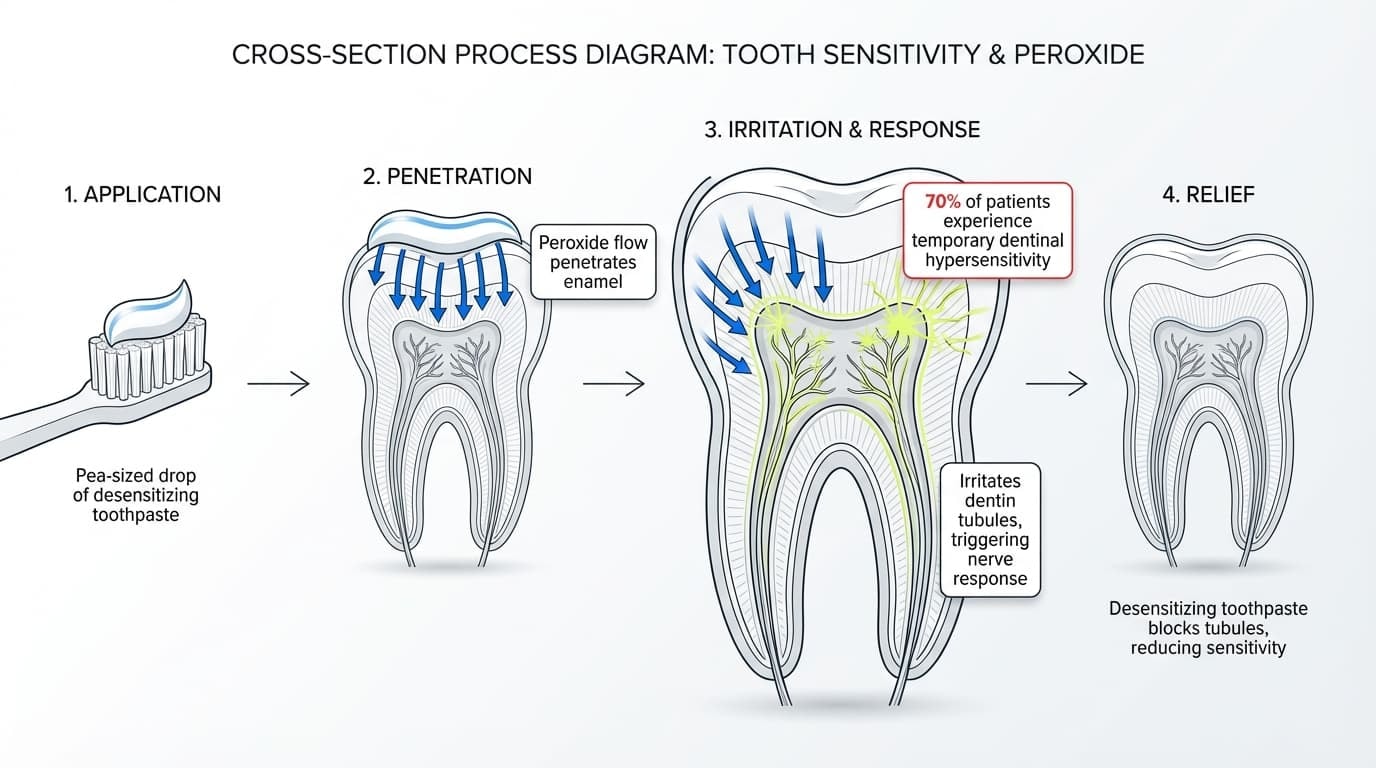
If your teeth's sensitivity ever catches you off guard, pause for a moment. You are not alone, and you did not ruin your smile.
Tooth pain after whitening is one of the most common side effects of peroxide-based bleaching agents. According to a 2003 clinical review published in the Journal of Evidence-Based Dental Practice, up to 70 percent of patients experience temporary dentinal hypersensitivity during peroxide-based whitening protocols.
The reassuring part is that this reaction is usually temporary and tends to settle within a few days. As your teeth adjust, switching to a toothpaste designed for sensitive teeth can make a noticeable difference. Ingredients like potassium nitrate help calm nerves in the tooth, while stannous fluoride helps strengthen and protect enamel.
Dental professionals recommend that users apply a pea-sized drop of desensitizing toothpaste directly to the affected tooth and allow the formula to sit for 60 seconds prior to rinsing. This allows the active ingredients more time to work and can significantly ease discomfort.
Whitening works by penetrating the enamel to lift stains, not by stripping it away. In healthy teeth, that process is reversible, and the sensitivity fades as the teeth return to their normal state.
How Whitening Strips Work and Why They Cause Sensitivity
If your teeth suddenly feel sensitive after whitening, it helps to understand what is actually happening beneath the surface. The science explains both the brightness and the temporary discomfort.
1. The Role of Bleaching Agents
Most commercial whitening strips utilize hydrogen peroxide at concentrations between 6% and 10% as their primary active bleaching agent.
These chemical agents utilize an oxidation process to break apart complex stain molecules trapped within the microscopic pores of the tooth enamel and underlying dentin.
While this chemical reaction is highly effective at visibly brightening the tooth structure, the necessary penetration of the peroxide through the enamel is exactly what triggers temporary nerve irritation and subsequent sensitivity.
These bleaching agents work through oxidation. They break apart stain molecules trapped in tooth enamel and dentin, making teeth appear visibly whiter. This chemical reaction is what gives you results.
But to remove deeper stains, peroxide has to penetrate beyond the surface.
2. Enamel Is Strong, But Not Solid
Tooth enamel is the hardest substance in your body, yet it is not completely sealed. It contains microscopic pores that allow small molecules, such as peroxide, to pass through.
As bleaching agents move through enamel, they create tiny pathways that expose the sensitive inner layer called dentin. That exposure is what allows whitening to work, but it also increases the chance of temporary sensitivity.
This is intentional. Without penetration, whitening treatments would only clean the surface and not change intrinsic discoloration.
However, beneath the enamel lies dentin, and dentin is far more sensitive.
3. The Dentin Tubule Effect
Dentin contains thousands of microscopic fluid-filled channels called dentin tubules. These tubules connect directly to the nerve tissue inside your tooth.
When peroxide enters these tubules, it causes fluid movement. That movement stimulates nerve endings and produces the sharp sensation many people describe as a “zinger,” especially when exposed to cold air or water.
When dentin tubules are exposed to bleaching agents, fluid movement within them makes the dental nerve highly reactive to temperature fluctuations.
This tubule exposure is the precise mechanical reason why consuming ice water, eating sugary foods, or inhaling a sharp breath of cool air triggers sudden, acute discomfort during a whitening cycle.
A 2021 study published in Scientific Reports found that hydrogen peroxide activates pain receptors known as TRPA1. This activation increases calcium influx into cells and triggers the release of inflammatory chemicals such as TNFα and IL-6, which amplify signaling.
4. Reversible Pulp Inflammation
Clinical and laboratory studies show that peroxide can reach the pulp chamber and trigger temporary inflammation, a condition known as reversible pulpitis.
The keyword is reversible.
In healthy teeth, this inflammation settles once exposure to peroxide stops. Importantly, short-term use of whitening strips as directed has not been shown to permanently damage healthy enamel in the majority of users.
Sensitivity can feel intense, but, biologically, it is usually a temporary inflammatory response rather than structural damage to your teeth.
How Long Does Sensitivity After Whitening Strips Last?
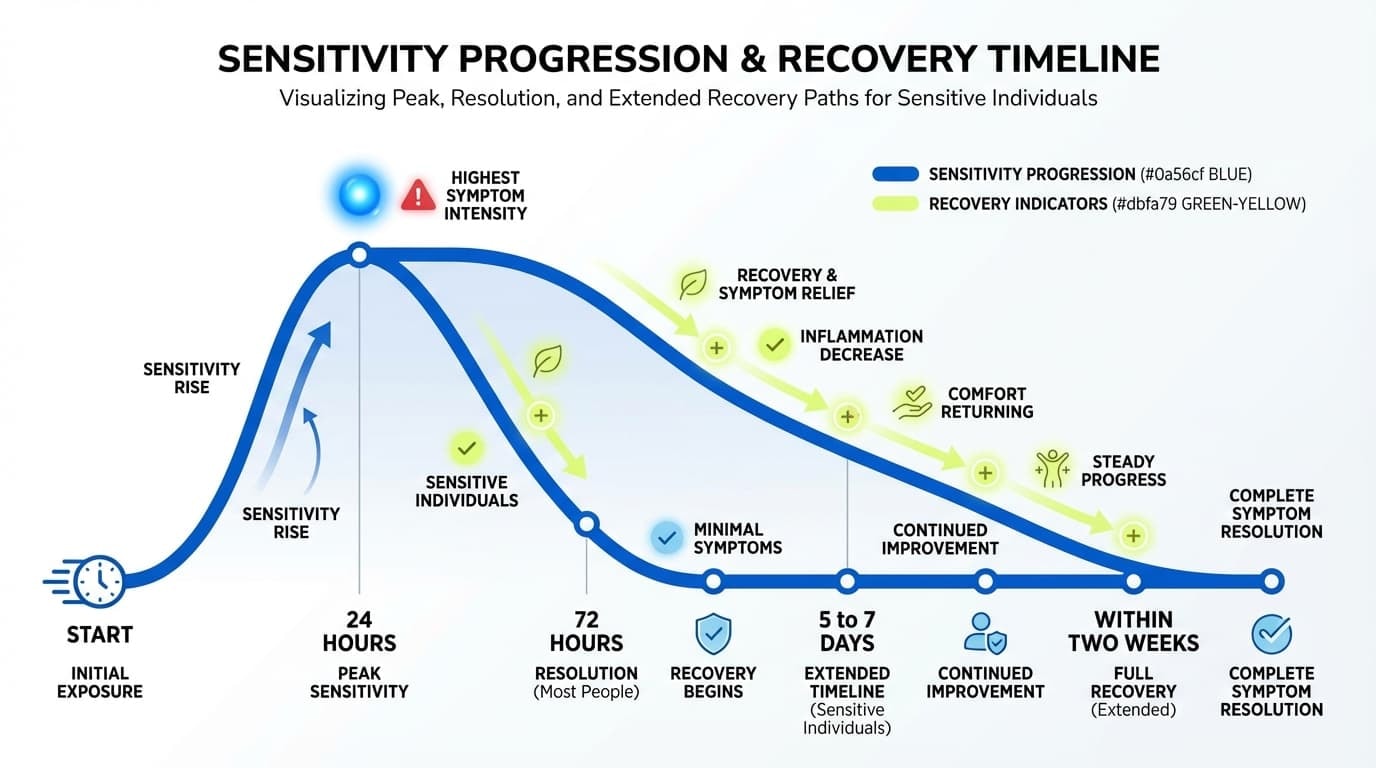
If your teeth feel sensitive right now, you probably are not thinking about shade charts or brighter smiles.
You are thinking, “How long is this going to hurt?”
That is a completely fair question. Let’s walk through what that actually looks like in real life.
The Typical Timeline Most People Experience
For most people, sensitivity from whitening strips peaks within the first 24 hours and begins improving within 24 to 72 hours after stopping use. In healthy teeth, this reaction is temporary and part of the normal biological response to bleaching agents reaching the inner layers of the tooth.
You may notice:
-
A sharper reaction to cold water
-
Sensitivity when breathing in cool air
-
A quick jolt when eating something sweet
What matters most is the direction of change. If each day feels slightly better than the one before, your teeth are calming down exactly as expected.
This happens because once the peroxide clears and the pulp inflammation settles, the nerve signaling decreases. The tissue inside your tooth returns to baseline.
That steady improvement is the key sign of normal healing.
When Sensitivity Lasts a Little Longer
Some people need more time.
If you already had sensitive teeth before whitening, thin enamel, gum recession, or if you used higher concentration strips, discomfort can last closer to five to seven days. That does not automatically mean damage. It usually means your nerves were already more reactive.
Clinical data support this. A 2002 study examining at-home whitening with 15 percent carbamide peroxide found that even moderate and severe sensitivity resolved within two weeks. Even stronger reactions were temporary.
You may also notice that your lower front teeth feel worse than your upper teeth. That is not your imagination. Those teeth tend to have thinner enamel and more exposed dentin, which makes them more reactive.
Knowing this can prevent unnecessary panic.
A Simple Rule That Experts Use
If sensitivity is improving day by day, your teeth are healing.
If the pain remains the same, becomes sharper, or persists beyond 5 to 7 days without improvement, it is time to pause and schedule a dental evaluation.
Progress matters more than intensity.
When Sensitivity Is Normal and When It Is a Red Flag
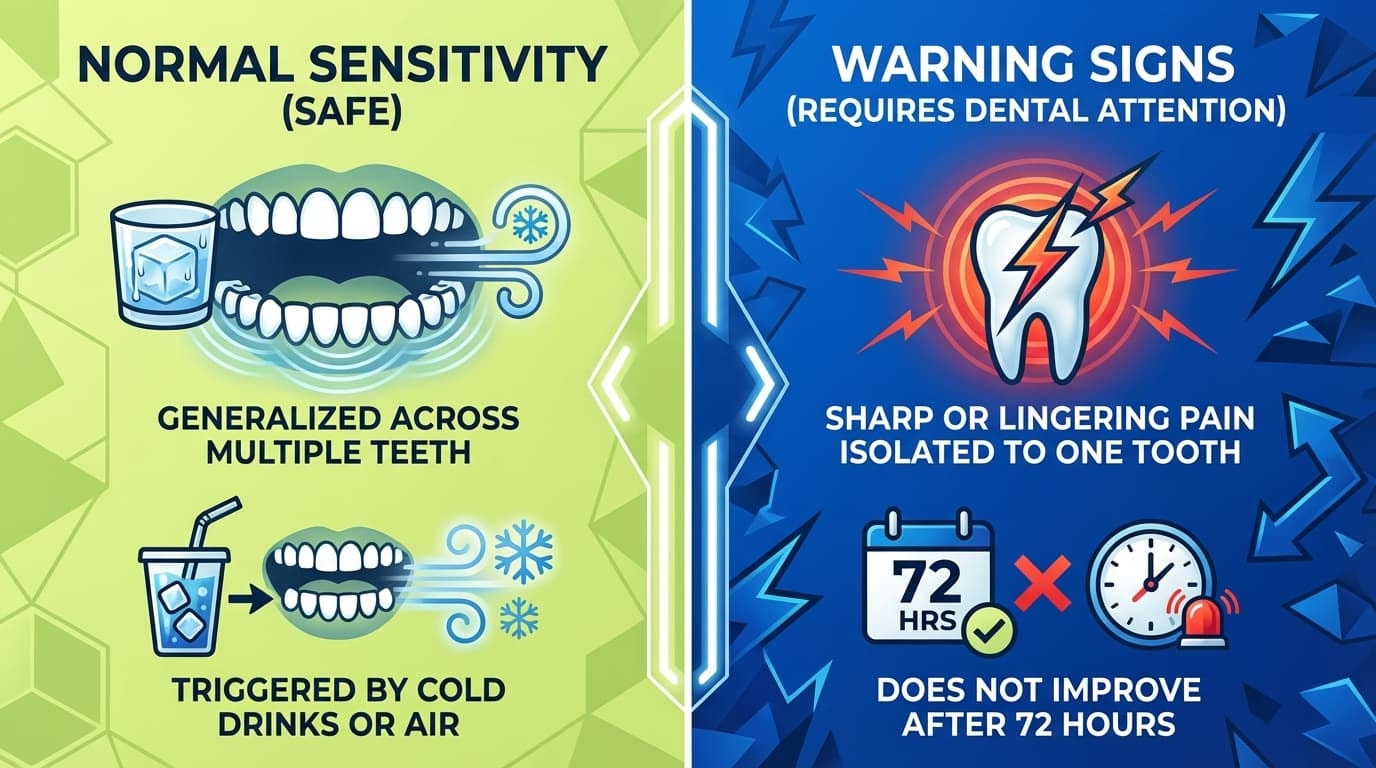
Not all tooth pain after whitening means the same thing. The pattern and behavior of the pain tell us far more than the initial intensity.
What Normal Whitening Sensitivity Looks Like
Normal sensitivity tends to be:
-
Generalized across multiple teeth
-
Triggered by cold drinks or air
-
Short-lived and sharp rather than throbbing
-
Gradually improving after stopping whitening
-
A mild, dull ache at the end of a whitening cycle
You may also notice slight gum irritation if the strips come into contact with the gumline. That usually resolves quickly once exposure stops.
This type of reaction is common with peroxide-based whitening systems. It reflects temporary nerve stimulation, not structural damage to tooth enamel.
Signs That Deserve Professional Attention
There are situations where whitening uncovers an underlying problem.
You should contact a dentist if you experience:
-
Sharp or lingering pain isolated to one tooth
-
Throbbing pain that wakes you at night
-
Sensitivity that does not improve after 72 hours of rest
-
Significant discomfort is still present after a full week
-
Visible cracks, chipped fillings, dark discoloration, or swollen gums
Pain that is isolated to one tooth often signals something deeper, such as a cavity, a crack, a leaking filling, or an infection. Whitening did not cause it, but it may have exposed it.
That distinction is important.
At SNOW, we always emphasize that whitening should feel controlled and manageable. Mild sensitivity can happen. Severe or persistent pain is not something you push through.
Your smile journey should feel safe, informed, and supported. And if something feels off, listening to your body is always the right move.
Immediate Relief: What To Do When Your Teeth Hurt After Whitening Strips
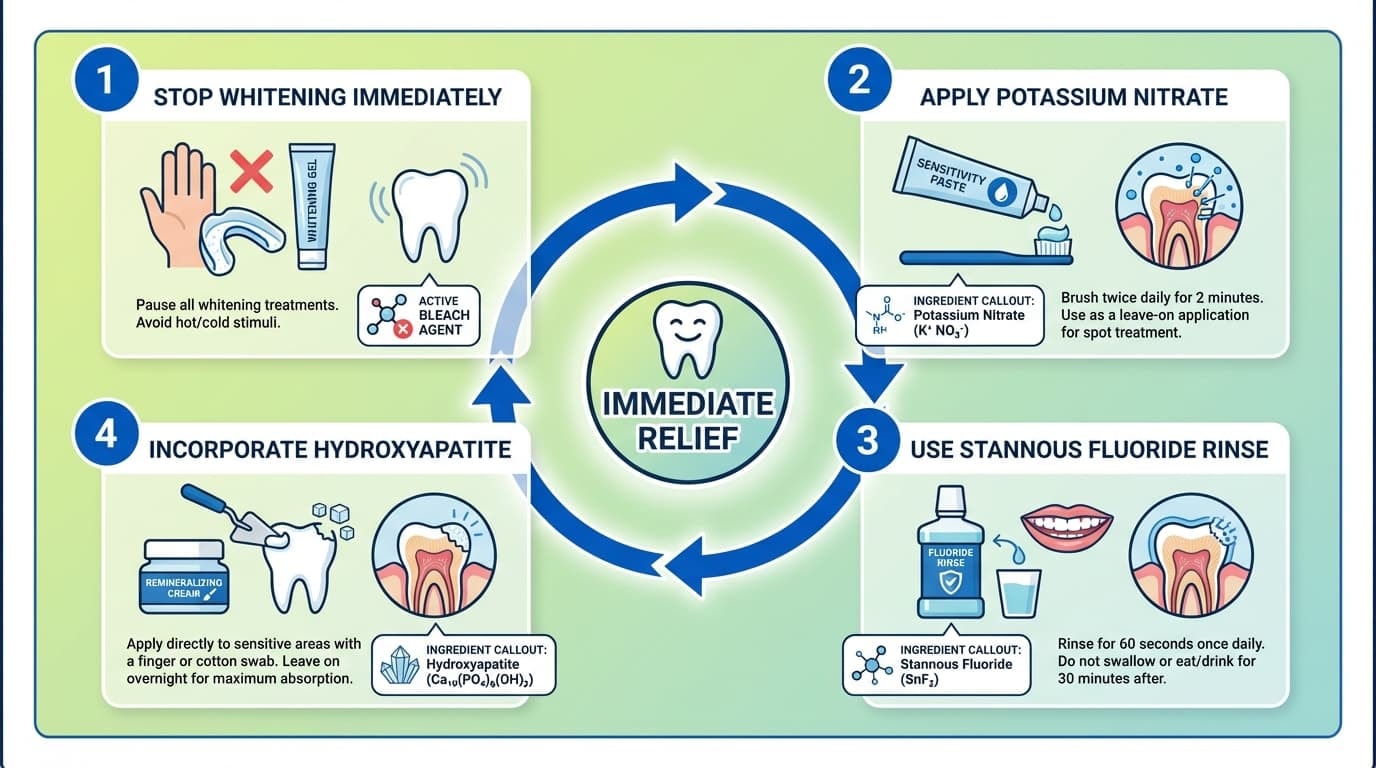
If your teeth are hurting right now, focus on two things: calming inflammation and protecting your enamel.
Sensitivity after whitening can feel intense, but in most cases, it is temporary. The key is to respond strategically rather than react emotionally.
Ingredients That Truly Help Sensitivity
When enamel is irritated, you want support, not abrasion.
Focus on:
-
Potassium Nitrate: Clinically shown to calm nerve activity and reduce whitening-related sensitivity.
-
Stannous Fluoride: Helps block exposed dentin tubules and supports enamel remineralization.
-
Hydroxyapatite: A mineral that mirrors the natural building blocks of enamel. It helps reinforce the tooth surface and reduce discomfort during whitening.
This is why hydroxyapatite appears across multiple SNOW systems, including the DiamondSeries Kit, Professional Dissolving Strips, and Overnight Sensitive Serum. The goal is balanced whitening that supports enamel instead of overwhelming it.
Step 1: Stop Whitening Immediately
If your teeth are throbbing or sharply reactive, pause all whitening.
Trying to push through discomfort can worsen pulp inflammation and extend recovery time. Give your teeth several days to fully calm before restarting any whitening routine.
When you do return to whitening, consider switching to a system formulated with built-in sensitivity support. For example, the SNOW DiamondSeries Teeth Whitening Kit with Hydroxyapatite and Potassium Nitrate is designed to whiten while actively helping reduce sensitivity. Potassium nitrate helps calm nerve signals, while hydroxyapatite supports enamel during the process.
Shop The SNOW DiamondSeries Kit
That balance can make a significant difference for people who struggle with traditional strips.
Step 2: Switch to a Desensitizing Toothpaste
During recovery, use a desensitizing toothpaste that contains potassium nitrate or stannous fluoride twice daily.
These ingredients work by calming nerve activity and blocking exposed dentin tubules. Over several days, they reduce the intensity of sharp reactions to cold or air.
For faster relief, apply a pea-sized amount directly onto the sensitive teeth with your finger. Let it sit for one to two minutes before spitting. Avoid rinsing immediately to keep the active ingredients in contact with the enamel longer.
If enamel support is a priority for you, incorporating products with hydroxyapatite can also help reinforce the tooth surface. This ingredient is found in SNOW’s Professional Dissolving Teeth Whitening Strips with Hydroxyapatite, which are designed to help remineralize enamel while whitening, making them a gentler option compared to some traditional strip formats.
Explore SNOW’s Hydroxyapatite Strips
Brush gently with a soft-bristle toothbrush. Pressure matters more than people realize.
Step 3: Avoid Temperature and Acid Triggers
To prevent further fluid movement within the dentin tubules during the 24-48 hour recovery window, users must strictly avoid the following dietary triggers:
-
Thermal Extremes: Ice water and hot coffee stimulate the inflamed dental pulp.
-
Acidic Compounds: Citrus fruits and vinegar-based dressings further erode the temporary pellicle layer.
-
High-Sucrose Foods: Sugary snacks create osmotic pressure changes that trigger acute nerve pain.
Skip ice water, very hot coffee, citrus fruits, vinegar-based dressings, and highly sweet snacks. These can intensify sensitivity while dentin tubules are still reactive.
Use lukewarm water for drinking and brushing. Also, keep your environment neutral while your teeth stabilize.
If you are especially sensitive but still want to maintain brightness, a gradual system such as the SNOW Overnight Sensitive Teeth Whitening Serum with Hydroxyapatite may be a better long-term approach. It is formulated to gently whiten while helping support enamel overnight, which many users find more comfortable than high-intensity strip sessions.
Try The SNOW Overnight Sensitive Serum
Step 4: Reduce Inflammation If Necessary
Under the guidance of a doctor, an over the counter anti inflammatory such as ibuprofen can help reduce pulp inflammation. Always follow label directions.
The goal is not to mask ongoing damage. It is to help calm the temporary inflammatory response.
How to Prevent Sensitivity From Whitening Strips Next Time
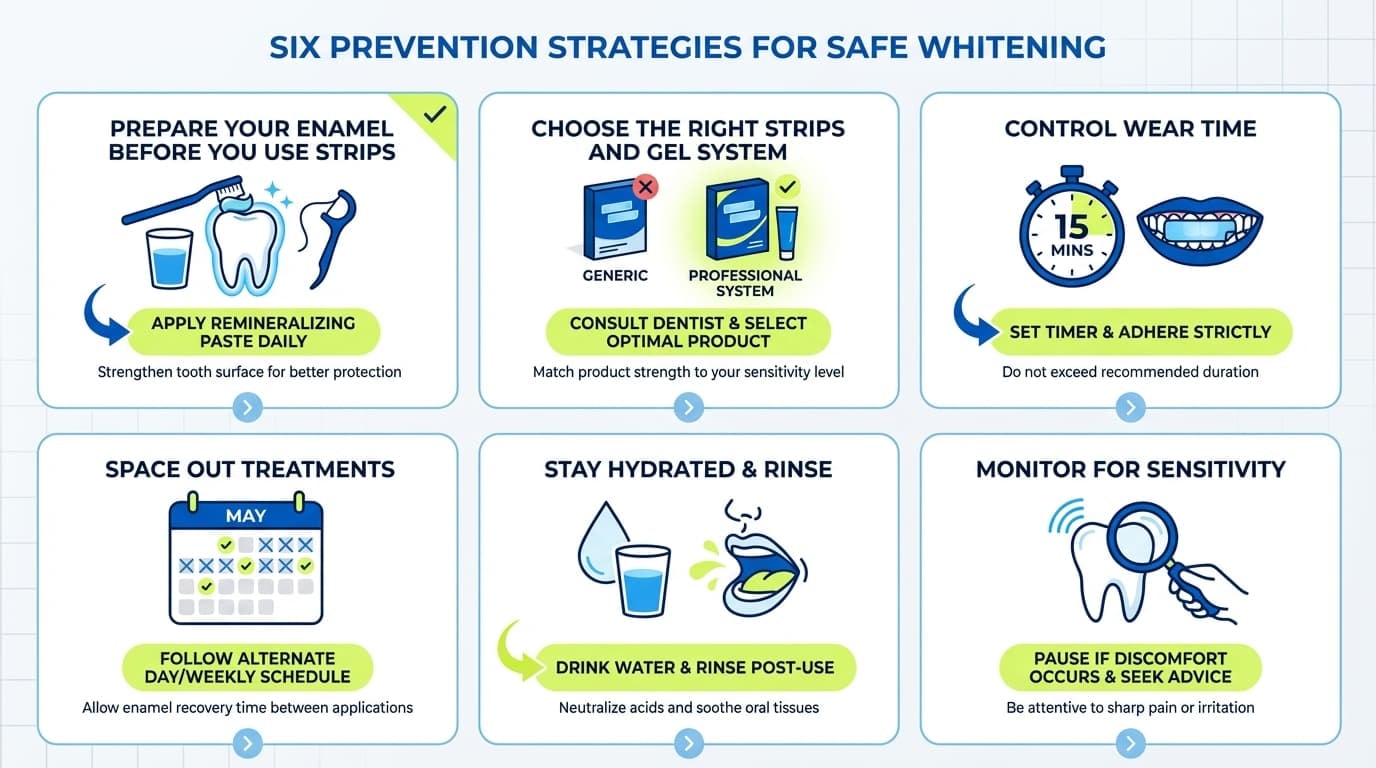
If you experienced sensitivity or pain after using whitening strips, the goal next time is to prevent it.
A brighter smile should not come at the cost of lingering discomfort, gum irritation, or nerve pain. Whitening is a chemical process that uses peroxide to bleach stains beneath the enamel surface.
When used strategically, strips can be effective. When done aggressively, they can irritate the nerves inside your teeth and your gums.
The difference is preparation.
Here is how to protect your enamel, calm sensitivity, and brighten safely.
1. Prepare Your Enamel Before You Use Strips
Think of this as pre-treatment for your teeth.
Two weeks before starting whitening strips, brush twice daily with a fluoride toothpaste formulated for sensitive teeth. This helps strengthen enamel and calm the nerves before peroxide exposure begins.
Consistent brushing with a gentle toothbrush and a fluoride toothpaste reduces the risk of irritation and prepares your gums for contact with strips.
Many dentists recommend this preparation phase because it reduces post-whitening pain and improves tolerance to peroxide-based bleaching systems.
This is one of the simplest tips that makes a major difference.
2. Choose the Right Strips and Gel System
Not all strips are the same.
Higher peroxide concentrations bleach stains faster, but they also increase sensitivity and gum irritation. If your gums are prone to irritation or your enamel is thin, choose strips formulated for sensitive teeth.
For example, SNOW Professional Dissolving Whitening Strips with hydroxyapatite are designed to brighten while supporting enamel. The added minerals help reduce discomfort during the whitening process.
Shop SNOW Professional Dissolving Strips
If you prefer a controlled-gel system over traditional strips, the SNOW DiamondSeries Whitening Kit combines peroxide with hydroxyapatite and potassium nitrate to help calm nerves and support enamel while whitening.
Shop The SNOW DiamondSeries Kit
A balanced formula helps strips work effectively without overwhelming your mouth.
3. Control Wear Time
If whitening strips say to wear for 30 minutes, do not assume you must start there.
Begin with 10 to 15 minutes. Gradually increase wear time only if sensitivity does not worsen. Overexposure to peroxide increases nerve irritation and gum inflammation.
The goal is gradual brightening, not aggressive bleaching.
4. Space Out Treatments
Daily strips are not mandatory.
Allow 48 hours between whitening treatments. This gives the enamel time to recover and allows nerves inside the tooth to settle.
Spacing sessions reduces cumulative irritation and prevents prolonged pain.
5. Time Your Brushing Carefully
Do not brush immediately before or after using whitening strips.
Brushing can temporarily open enamel pores and irritate gums, increasing sensitivity. Wait at least 30 minutes before and after whitening.
Use a soft toothbrush and a gentle toothpaste. Aggressive brushing does not remove stains faster. It only wears enamel and irritates gums.
6. Avoid Trigger Foods and Drinks After Whitening
After removing strips, your enamel is more reactive.
For several hours, avoid:
-
Red wine
-
Acidic foods
-
Very hot drinks
-
Ice cold drinks
-
Sugary foods
Temperature extremes and acids can irritate dentin, leading to increased discomfort.
Protecting enamel during this window helps reduce post treatment pain.
Smart Whitening Tips From a Strategic Approach
Whitening should be intentional.
Track Sensitivity Patterns
Keep notes on when you use strips, how long you wear them, and how your mouth feels afterward. This helps you identify your threshold and avoid severe sensitivity.
Stop When You Reach Your Goal
There is no rule that says you must finish every box of strips.
Once your smile reaches your desired shade, stop. Continuing to bleach beyond that point increases the risk of irritation without meaningful improvement.
Maintenance Over Marathons
Instead of repeated full strip cycles, maintain results gradually. A lower-intensity option, like the SNOW Overnight Sensitive Whitening Serum with hydroxyapatite, allows you to brighten gradually while supporting enamel overnight.
Try The SNOW Overnight Sensitive Serum
This type of approach reduces pain and long-term sensitivity.
Do Not Ignore Red Flags
If sensitivity becomes severe, if gums are swollen, or if pain persists beyond several days, consult a dentist.
Whitening strips do not usually cause permanent damage, but they can reveal underlying issues such as enamel cracks, gum recession, or decay.
A dentist can evaluate whether the discomfort is due to simple peroxide irritation or to something requiring treatment. In some cases, professional fluoride application in the office may help reduce sensitivity.
Are Home Remedies Enough?
Some people try home remedies such as oil pulling or baking soda to reduce sensitivity after strips. While certain home remedies may temporarily soothe, they do not repair enamel or calm nerves within the tooth as effectively as fluoride toothpaste or professional treatment.
If you are unsure, consult a dentist rather than experimenting with harsh DIY bleach solutions that may further irritate enamel and gums.
When to Call a Dentist About Sensitive Teeth After Whitening Strips
Sometimes self-care isn’t enough. Seek professional advice if:
-
Pain is severe, throbbing, or keeps you awake at night after using strips
-
Sensitivity does not noticeably improve within 48–72 hours of stopping whitening
-
One tooth hurts significantly more than the others (this could indicate a cavity, crack, or abscess)
-
You notice gum blistering, white chemical burns on soft tissue, or dark discoloration developing after whitening
-
You’ve tried the prevention protocol, and strips still cause intolerable discomfort every time
A dentist can offer targeted solutions. These include professional desensitizing treatments, custom-fit whitening trays that reduce gum irritation, or alternative cosmetic options, such as veneers, if bleaching simply isn’t tolerated.
Final Thoughts
Sensitivity after whitening strips can feel alarming, but in most cases, it is temporary and manageable. Your enamel is stronger than you think, and when teeth whitening products are used correctly, they can safely lift stains and brighten your smile without causing lasting damage.
The key is balance. Respect the process, protect your enamel, listen to your gums, and do not ignore persistent pain. If something feels unusual, consult a dentist for proper advice and treatment.
If traditional strips have left your teeth sensitive, it may be time to upgrade your approach. The SNOW collection is designed to brighten while supporting enamel, with options formulated for comfort and controlled whitening.
Explore the SNOW Whitening Collection
FAQs
Have questions? Our team at SNOW is eager to answer your questions.
Can whitening strips cause permanent tooth sensitivity?
Whitening strips can cause temporary tooth sensitivity, but permanent sensitivity is uncommon when used as directed. Ongoing sensitivity is often linked to underlying issues such as enamel erosion, gum recession, or cracks. Avoid overuse or extended wear times to reduce risk.
Is it okay to use whitening strips if I already have sensitive teeth?
Yes, you can use whitening strips if you already have sensitive teeth, but you need a modified approach. Consult a dentist first, use a desensitizing toothpaste for two weeks before starting, and space treatments at least 48 hours apart. Choose lower concentration strips and shorter wear times.
Can I use whitening strips on crowns, fillings, or veneers?
Whitening strips do not lighten crowns, fillings, or veneers. They only work on natural tooth enamel, so your natural teeth may brighten while restorations stay the same shade. Consult your dentist if you are concerned about uneven color.
Should I brush my teeth before or after using whitening strips?
You should not brush immediately before or after using whitening strips. Brush at least 30 minutes before applying strips or wait 30 minutes after removing them. Use a soft toothbrush and non-abrasive toothpaste while whitening.
What can I do if whitening strips always make my teeth hurt, even when I’m careful?
If whitening strips always make your teeth hurt, you may be sensitive to how they deliver hydrogen peroxide. Talk to your dentist about custom trays, lower concentration gels, or in-office whitening options. A dental exam can rule out hidden causes of pain before trying another treatment.
































































